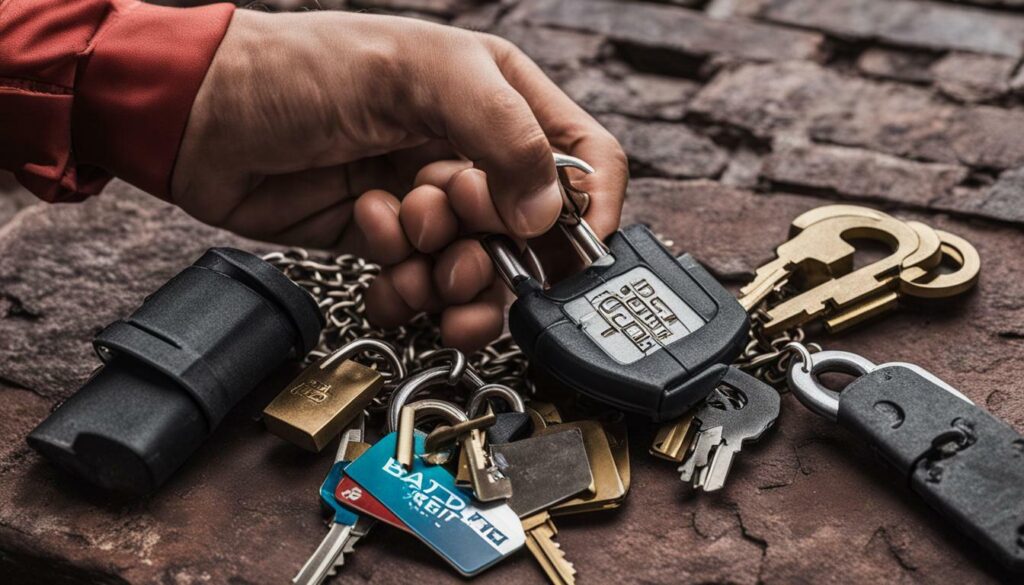Unlocking Credit Repair Solutions in the Gig Economy

The gig economy has revolutionized the way people work, but it has also presented new challenges for credit repair. In this section, we will explore the unique difficulties faced by gig workers when it comes to improving their credit scores, as well as the available credit repair services designed specifically for those in the gig economy.
- Credit scores often fail to take into account a gig worker’s full financial situation, making it difficult for them to access basic financial products, despite having good credit scores.
- The CEO of Rollee, an employment data platform, suggests implementing a fairer and more transparent credit scoring system that evaluates risk manually and integrates alternative income and employment data. This would provide a more accurate representation of a gig worker’s creditworthiness.
- Crafting effective credit repair letters is crucial for addressing credit issues. Dispute.ly’s AI Credit Repair Software offers gig workers access to credit reports and generates customized dispute letters to remove or correct derogatory information.
- The Consumer Financial Protection Bureau (CFPB) has proposed a settlement against certain credit repair companies, banning them from telemarketing credit repair services for 10 years. This settlement aims to address the issue of illegal advance fees and protect gig workers seeking credit repair services.
- Those in the gig economy can benefit from credit-building tools offered by Dispute.ly’s AI Credit Repair Software, aiding them in their journey to improve their credit scores and gain access to better financial opportunities.
The Importance of Credit Repair for Gig Economy Workers
As a gig economy worker, your credit score plays a vital role in your financial wellness and access to essential financial products. However, credit repair can be especially challenging for gig workers due to the unique nature of their income sources. Traditional credit scoring models often struggle to accurately capture the full extent of a gig worker’s financial situation, leaving them at a disadvantage when it comes to improving their credit scores.
To overcome these challenges, it is important for gig economy workers to adopt effective credit repair strategies. One of the best credit repair services for gig workers is Dispute.ly’s AI Credit Repair Software. This software provides access to credit reports and generates customized dispute letters to help remove or correct derogatory information that may be affecting your credit score. Additionally, the software offers credit-building tools that can assist you in improving your creditworthiness over time.
It’s important to note that credit repair is not just about fixing mistakes or disputing inaccurate information. It also involves taking proactive steps to build positive credit history. This can include paying your bills on time, keeping your credit utilization low, and diversifying your credit mix. By following these credit repair tips for gig economy workers, you can make significant strides towards improving your credit score and opening up more opportunities for financial stability.
Credit Repair Tips for Gig Economy Workers
- Monitor your credit reports regularly to identify any errors or inaccuracies that may be dragging down your credit score.
- Utilize Dispute.ly’s AI Credit Repair Software to generate customized dispute letters and speed up the process of correcting derogatory information on your credit reports.
- Focus on building positive credit history by making timely payments, keeping your credit utilization low, and responsibly managing your credit accounts.
- Consider seeking professional credit repair services that specialize in assisting gig economy workers and understanding the unique challenges they face.
By following these gig economy credit repair strategies and utilizing the right tools and resources, you can take control of your credit score and improve your financial prospects for the future.
🚨 TUIC Errors + Low Credit Score?
CreditScoreIQ helps you build credit faster by reporting utility bills to all 3 bureaus—while you dispute errors.
Start Building Credit Today →Proposed Settlement Against Credit Repair Companies
In recent news, the Consumer Financial Protection Bureau (CFPB) has reached a proposed settlement with credit repair companies, including Lexington Law and CreditRepair.com. This settlement is a result of these companies allegedly collecting illegal advance fees for credit repair services through telemarketing. If approved, the settlement would ban these companies from offering telemarketing credit repair services for a period of 10 years, ensuring gig economy workers are protected from potentially deceptive practices in the industry.
| Company | Proposed Settlement |
|---|---|
| Lexington Law | Banned from telemarketing credit repair services for 10 years |
| CreditRepair.com | Banned from telemarketing credit repair services for 10 years |
This proposed settlement highlights the importance of conducting thorough research and due diligence when seeking credit repair services. It is essential to choose reputable companies that comply with industry regulations and prioritize the best interests of gig economy workers.
Remember, improving your credit score takes time and effort, but with the right strategies and resources, you can pave the way for a brighter financial future as a gig economy worker.
Challenges Faced by Gig Workers in Traditional Credit Scoring Models
Traditional credit scoring models often fail to accurately assess the creditworthiness of gig workers, leading to hurdles in credit repair. These models primarily rely on income stability and employment history, which do not accurately reflect the financial situation of gig workers. As gig workers often have multiple streams of income and non-traditional employment arrangements, their creditworthiness is not adequately captured by traditional scoring systems.
Gig workers, such as freelancers and self-employed individuals, face challenges in establishing a strong credit profile due to the lack of documentation and verifiable income sources. This can result in lower credit scores or even denial of credit, making it difficult for gig workers to access financing options or secure favorable terms on loans and credit cards.
To overcome these challenges, credit repair solutions specifically tailored to the needs of gig economy professionals have become essential. These solutions recognize the unique circumstances of gig workers and take into account alternative income and employment data. By considering the full picture of a gig worker’s financial situation, these specialized credit repair options provide a more accurate assessment of creditworthiness and offer appropriate strategies to improve credit scores.
In addition to alternative credit scoring models, it is crucial for gig workers to craft effective credit repair letters when addressing credit issues. Utilizing Dispute.ly’s AI Credit Repair Software, gig workers can access their credit reports and generate customized dispute letters to challenge and rectify derogatory information. This software provides an efficient and streamlined process for gig workers, helping them to improve their credit scores and achieve their financial goals.
Overall, the gig economy presents unique challenges for gig workers in traditional credit scoring models. However, with the advent of specialized credit repair solutions and innovative tools like Dispute.ly’s AI Credit Repair Software, gig workers now have access to resources that can help them overcome these challenges and improve their credit scores.

To address the credit scoring challenges in the gig economy, industry experts propose the adoption of a more inclusive and transparent credit scoring system. Traditional credit scoring models fail to adequately assess the financial stability and creditworthiness of gig workers due to the limitations of considering only traditional employment and income sources.
Gig economy workers often have multiple streams of income and rely on platforms like Uber, Airbnb, or TaskRabbit for their livelihood. These non-traditional sources of income present unique challenges as they are not easily recognized or included in credit scoring calculations. As a result, gig workers with steady incomes and good credit scores may still face difficulties in accessing basic financial products and services.
To overcome these challenges, implementing a fairer and more transparent credit scoring system is crucial. This involves manually evaluating risk factors and incorporating alternative income and employment data that accurately reflect the financial stability of gig workers. Integrating external API infrastructure and scaling up data sharing among financial institutions and gig work platforms are also recommended to ensure a comprehensive assessment of gig workers’ creditworthiness.
| Challenges Faced by Gig Workers in Traditional Credit Scoring Models | Suggested Solutions |
|---|---|
| 1. Limited recognition of non-traditional income sources | – Manual evaluation of risk factors – Integration of alternative income and employment data |
| 2. Incomplete depiction of financial stability | – Scaling up integration with external API infrastructure – Enhanced data sharing among financial institutions and gig work platforms |
| 3. Denial of access to basic financial products despite good credit scores | – Inclusive evaluation of creditworthiness – Consideration of multiple income streams |
A more inclusive credit scoring system that incorporates the unique circumstances of gig workers would not only provide them with equal opportunities in accessing financial products and services but also contribute to a fairer and more accurate representation of their creditworthiness.

“By adopting a more inclusive credit scoring system, we can ensure that gig workers are not unfairly penalized due to the limitations of traditional credit models. It is crucial to consider their alternative income sources and assess their financial stability accurately.” – CEO of Rollee
The Role of Effective Credit Repair Letters
When addressing credit issues, well-crafted credit repair letters can be an essential tool for gig economy workers. These letters allow individuals to dispute inaccurate or derogatory information on their credit reports, ultimately working towards improving their credit scores. Dispute.ly’s AI Credit Repair Software offers a user-friendly platform that generates customized dispute letters based on the specific needs of gig economy professionals.
The software provides access to credit reports, highlighting any negative items that may be impacting the individual’s creditworthiness. Through its intuitive interface, gig economy workers can easily navigate their credit reports and identify items that require attention. Dispute.ly’s AI technology then generates tailored dispute letters, which can be sent to credit bureaus to request the removal or correction of inaccurate or misleading information on the report.
By leveraging the power of artificial intelligence, Dispute.ly’s software streamlines the credit repair process for gig economy professionals. It eliminates the need for manual letter writing and ensures that the dispute letters are effective and compliant with credit bureaus’ requirements. This saves gig economy workers valuable time and effort, enabling them to focus on their work while taking proactive steps towards improving their credit scores.
| Benefits of Dispute.ly’s AI Credit Repair Software |
|---|
| Automated generation of customized dispute letters |
| Access to credit reports for thorough analysis |
| User-friendly interface for ease of navigation |
| Compliance with credit bureaus’ requirements |
| Time-saving solution for gig economy workers |
Testimonial from a Satisfied User
“Dispute.ly’s AI Credit Repair Software has been a game-changer for me as a gig economy worker. It simplifies the credit repair process and saves me countless hours of writing dispute letters. The software’s analysis of my credit report helps me identify issues that were affecting my score, and the generated dispute letters have been successful in removing inaccurate information. I highly recommend Dispute.ly to all gig economy professionals looking to repair their credit!”
With the assistance of Dispute.ly’s AI Credit Repair Software, gig economy workers gain a valuable resource to address credit issues effectively. The software’s automation, accuracy, and compliance with credit bureaus’ requirements make it a reliable tool for credit repair in the gig economy. By leveraging the benefits of this innovative solution, gig workers can take control of their credit scores and enhance their financial stability in the ever-evolving gig economy.

The Consumer Financial Protection Bureau has taken action against credit repair companies for their illegal practices, impacting gig economy workers in need of credit repair services. One such proposed settlement targets companies like Lexington Law and CreditRepair.com, who have been accused of collecting illegal advance fees for credit repair services via telemarketing. The settlement, if approved, would impose a ban on these companies from telemarketing credit repair services for the next 10 years.
This proposed settlement holds significant implications for gig economy workers who rely on credit repair services to improve their credit scores. These workers, who often face unique challenges due to the nature of their employment, require legitimate and reliable credit repair assistance to access financial products and services. The action by the Consumer Financial Protection Bureau serves as a reminder of the importance of choosing reputable credit repair companies that operate within the bounds of the law.
It is crucial for gig economy workers to be aware of their rights and seek out credit repair services that adhere to legal guidelines. Understanding the legitimacy and compliance of a credit repair company is essential to protect one’s financial well-being. Additionally, individuals in need of credit repair should consider utilizing AI-powered platforms like Dispute.ly’s AI Credit Repair Software to access credit reports, generate personalized dispute letters, and utilize credit-building tools to effectively improve their credit scores.
Table: Proposed Settlement Overview
| Company | Proposed Settlement Terms |
|---|---|
| Lexington Law | Banned from telemarketing credit repair services for 10 years |
| CreditRepair.com | Banned from telemarketing credit repair services for 10 years |

Dispute.ly’s AI Credit Repair Software offers a comprehensive solution tailored to the credit repair needs of gig economy workers. In the gig economy, where freelance and gig workers often struggle with credit challenges, this software provides a powerful tool to help improve credit scores and access better financial opportunities.
One of the key features of Dispute.ly’s AI Credit Repair Software is its ability to provide gig workers with access to their credit reports. By obtaining a clear understanding of their credit history, gig workers can identify any derogatory information that may be impacting their credit scores. This valuable insight allows them to take proactive steps towards improving their credit profiles.
When it comes to addressing credit issues, Dispute.ly’s software generates customized dispute letters. These letters are a critical component of the credit repair process, as they are used to challenge inaccurate or misleading information on credit reports. By leveraging the software’s AI technology, gig economy workers can generate effective dispute letters that maximize their chances of success in removing or correcting derogatory information.
Additionally, Dispute.ly’s AI Credit Repair Software offers credit-building tools that are specifically designed to help gig workers improve their credit scores. These tools provide guidance and actionable steps that gig economy workers can take to establish positive credit history and increase their creditworthiness.
With its comprehensive suite of features, Dispute.ly’s AI Credit Repair Software empowers gig economy workers to take control of their credit repair journey. By utilizing this powerful tool, gig workers can overcome the unique challenges they face in the credit system and pave the way for better financial opportunities.
| Benefits of Dispute.ly’s AI Credit Repair Software for Gig Economy Workers |
|---|
| Access to credit reports |
| Customized dispute letters to challenge inaccuracies |
| Credit-building tools to improve credit scores |
Conclusion
Credit repair is a critical aspect for gig economy workers, and with the right strategies and services, it is possible to improve credit scores and achieve financial stability. The gig economy poses unique challenges for credit repair, as traditional credit scoring models fail to consider the full picture of a worker’s situation. Many gig workers have multiple streams of income, which can be difficult for these models to recognize. Consequently, even gig workers with good credit scores may be denied access to basic financial products.
To address this issue, industry experts, including the CEO of Rollee, have called for a fairer and more transparent credit scoring system. This proposed system would evaluate risk manually, integrate alternative income and employment data, and scale up integration with external API infrastructure. By considering these factors, gig workers can have their creditworthiness accurately assessed and gain access to the financial products they need.
In addition, crafting effective credit repair letters is crucial when addressing credit issues. Dispute.ly’s AI Credit Repair Software offers a solution to generate customized dispute letters, helping gig workers remove or correct derogatory information on their credit reports. The software also provides access to credit reports and offers credit-building tools to assist individuals in improving their credit scores.
Furthermore, the Consumer Financial Protection Bureau (CFPB) has taken action against certain credit repair companies, such as Lexington Law and CreditRepair.com. A proposed settlement would ban these companies from telemarketing credit repair services for 10 years due to their illegal collection of advance fees. This settlement, if approved, aims to protect gig workers from predatory practices and promote fair and ethical credit repair services.
Overall, gig economy workers can benefit from understanding the challenges they face in credit repair and the available strategies and services to overcome them. With a fairer credit scoring system, effective credit repair letters, and reliable credit repair services, gig workers can improve their credit scores and achieve financial stability in the ever-evolving gig economy.
FAQ
Q: How does the gig economy pose unique challenges for credit repair?
A: Credit scores in traditional models struggle to recognize multiple streams of income that gig workers often have, resulting in potential denial of financial products despite having good credit scores.
Q: What solution does the CEO of Rollee suggest for credit scoring in the gig economy?
A: The CEO suggests implementing a fairer and more transparent credit scoring system that manually evaluates risk, integrates alternative income and employment data, and scales up integration with external API infrastructure.
Q: How can credit repair letters help gig economy workers?
A: Crafted effective credit repair letters can address credit issues and dispute derogatory information. Dispute.ly’s AI Credit Repair Software provides access to credit reports and generates customized dispute letters for gig workers.
Q: Is there a proposed settlement against credit repair companies?
A: Yes, the Consumer Financial Protection Bureau (CFPB) has reached a proposed settlement against credit repair companies, including Lexington Law and CreditRepair.com, for collecting illegal advance fees for credit repair services via telemarketing. If approved, the settlement would ban these companies from telemarketing credit repair services for 10 years.
Ready to Improve Your Credit?
Disputing TUIC errors is step one. Step two? Boost your score by reporting utility payments with CreditScoreIQ.
Get Started Now (Only $1 Trial) →3-bureau reporting • $1M identity insurance • Dark web monitoring



